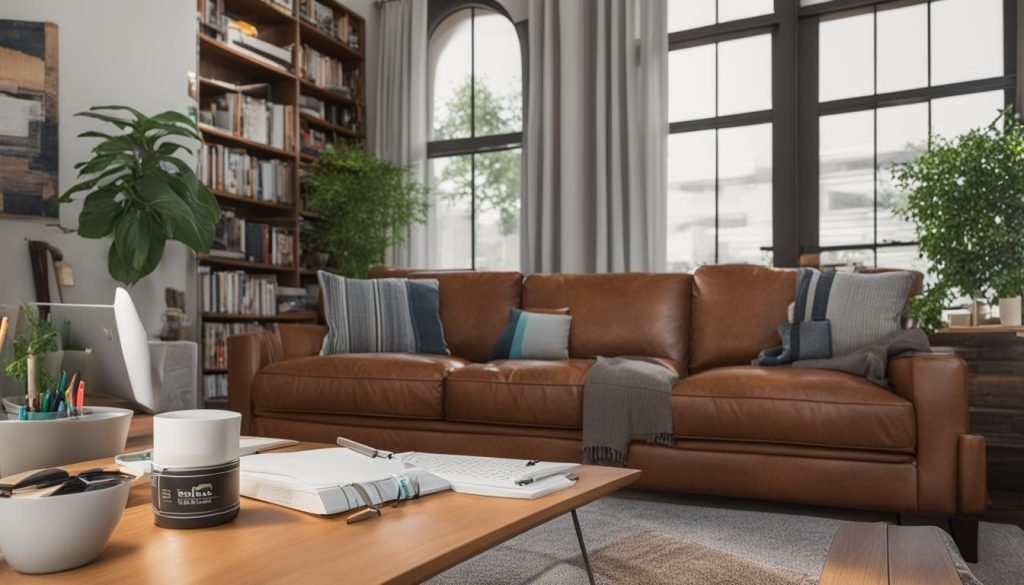As Singapore’s entrepreneurial spirit thrives, the quest to blend home living with business operations for renters takes on new importance. Navigating the policies of running business from rented home inevitably poses the question: can I run a business from home if I rent? Singapore’s innovative legislative framework facilitates such endeavors, ensuring a synergy between residential tranquility and business pursuits. Whether you’re renting property for business or hoping to transform your living space into an entrepreneurial hub, understanding Singapore home business regulations is essential for remaining compliant and seizing the opportunities of a dynamic economy.
Key Takeaways
- Exploring the possibility of establishing a home-based business within a rental property in Singapore.
- Understanding the Home Office Scheme and its allowances for running small-scale administrative operations.
- Recognizing the importance of complying with URA guidelines to maintain the residential integrity of the rented home.
- Navigating the legal requirements for business operations as a tenant, ensuring consent and adherence to regulations.
- Awareness of prohibited practices, such as displaying external business advertisements or causing residential dis-amenities.
Understanding the Home-Based Business Landscape in Singapore
The trend of pursuing a home-based business within the city-state has grown significantly, as more individuals seek to merge domestic life with vocational ambitions. Singapore’s unique blend of stringent regulations and support for entrepreneurs has established a robust Singapore home business framework. This compliance-centric approach harmonizes business activity with the residential tranquility expected within communities.
The Framework of Home-Based Business Schemes
Residents contemplating the establishment of a home-based venture must navigate the Singaporean landscape’s legal nuances. Adhering to the URA home-based business guidelines is imperative for keeping the primary use of the residence residential. Under the Home-Based Business Scheme, individuals are permitted to operate without URA’s explicit approval, provided that businesses adhere to several non-intrusive norms.
“The business operation might be within your personal domain, but its execution must align with the larger ethos of the residential area while satisfying the legal requirements for home-based businesses.” – URA Advisory
The permissible scope of operation—catering to services like baking, tuition, or sewing—underscores the importance of discretion and small scale. This model promotes a vibrant economy and entrepreneurial diversity without disrupting the fabric of community living.
Navigating the Regulations for Tenants and Property Owners
Tenants aspiring to delve into the realm of entrepreneurship from their rented accommodations must contend with additional layers of compliance. URA regulations for renting and home business demand that tenants obtain explicit consent from landlords. They must also observe the tenants’ business regulations which include prohibitions against hiring non-resident employees or displaying business advertisements on the premises.
- No disturbance to the peace of the residential community.
- Usage of household equipment only for business activities.
- Absence of heavy traffic or excessive storage of goods.
While tenants have the advantage of using the residential space for commercial gain, they must ensure that their business activities do not infringe upon the URA conditions of use or the peaceful ambiance of their community.

The Impact of Business Activities on Residential Nature
The impetus to maintain the residential nature preservation is a core principle of the URA’s regulations. The prime concern of the authority, alongside enabling small-scale commercial ventures, is to ensure that the impact of home businesses on residential communities remains minimal. This balanced focus protects both the entrepreneurial spirit of the individual and the collective experience of residential communities throughout Singapore.
- Excessive noise or business-related traffic is deemed disruptive.
- Non-domestic equipment and large deliveries are disallowed.
- Businesses causing disturbance can face cease or relocation orders.
The underpinning of the URA’s balancing act is a clear message: while entrepreneurship is encouraged, preservation of the residential ethos is paramount. As Singapore continues to advance economically, harmonizing business within the home setting will necessitate careful adherence to these foundational principles and regulations.
Legal Considerations for Running a Business from Your Rented Home
As the entrepreneurial landscape evolves, many Singaporeans are exploring the concept of starting a business while renting. While such initiatives can foster economic growth and personal development, it’s imperative to recognize and adhere to home-based business legal considerations. Navigating through Singapore rental business laws reveals specific mandates that ensure the welfare of both renters and the community at large.

Securing consent from the property owner is the initial and crucial step for any renter aspiring to start a home-based business. Renters need to obtain explicit permission to ensure the legal foundation for their entrepreneurial activities is solid. This consent safeguards the interests of the landlord and ensures that the proposed business operations are clearly understood by all parties involved.
“Prioritizing residential-use remains a cornerstone of Singapore’s tenancy agreements, underscoring the need for any home-based businesses to harmonize with the dwelling’s primary purpose.” – Residential Tenancy Advisory
Observance of the residential-use policy is not merely a formality but an essential component of home-based business legal considerations. Renters must conduct their business while retaining the home’s residential essence, facilitating a peaceful coexistence with neighbors and the broader community.
- Operation of a low-scale business is permissible, avoiding the employment of non-resident staff to maintain the non-commercial status of the residence.
- Aligning home business practices with community norms—significant traffic, noise, and external changes are to be avoided to maintain residential harmony.
- An understanding of the Singapore rental business laws helps in identifying the appropriate business activities that are suited for a home environment.
It is also worth considering that the presence of external business advertisements and displays are strictly prohibited on residential premises. This is a regulation put forth to shield residential areas from the commercialization that accompanies traditional business districts.
Lastly, developing a successful home-based business while renting demands a fine balance of entrepreneurial drive and respect for the sanctity of residential life. Regular interactions with property owners, coupled with consistent adherence to Singapore rental business laws, ensure a productive and compliant business endeavor within the comfort of one’s home.
The Home Office Scheme: Gateway to Your Entrepreneurial Venture
Embarking on an entrepreneurial journey often entails finding the perfect workspace to nurture and grow your business ideas. For many in Singapore, the Home Office Scheme has emerged as a viable option, providing a means to elegantly meld work life with home life. This scheme lays out comprehensive conditions for home office setups that are conducive to productivity while adhering to residential norms.
Eligibility and Conditions for Home Office Setups
Those who aspire to harness the potential of their living space for eligible home business operations under the Home Office Scheme must heed to a set of well-defined conditions. Paramount among these is the requirement that the primary use of the home must remain residential, thereby adhering to Singapore’s harmonious living standards. Furthermore, the scheme specifies that eligible businesses can operate with up to two non-resident employees, positioning it as an attractive option for small-scale business operations seeking flexibility and minimal overhead.
“To thrive within the perimeters of the Home Office Scheme, one must incorporate business activities seamlessly into the fabric of domestic life, without disturbing the residential ambiance.”
Understanding the conditions for home office setups is essential for anyone running a business from a rented home. It not only influences their daily operations but also ensures that their entrepreneurial activities remain above board and free from legal repercussions.

Embracing Small-Scale Operations: Do’s and Don’ts
In the heart of the vibrant and fast-paced Singaporean economy, small-scale business operations offer the flexibility and opportunity for entrepreneurship to flourish. As such, the Home Office Scheme supports endeavors that maintain a low profile, rooted in skill or service-based activities. Baking, freelance writing, and private tuition are some of the ventures that fit well within these parameters.
- Do: Keep business activities contained and in alignment with the residential character of the neighborhood.
- Do: Use domestic equipment that supports your business operations without drawing undue attention.
- Don’t: Engage in activities that lead to regular footfall or transport that could disturb the neighborhood’s serenity.
- Don’t: Assume any form of external signage or advertising that would disrupt the residential aesthetics.
To optimally function within this framework, do’s and don’ts of home business are explicitly stated to maintain the delicate balance between residential peace and business activity.
Compliance with these guidelines ensures that your home business is not just a transient venture but a sustainable economic entity that contributes to the broader goals of cohesive urban living. With the Home Office Scheme, the dreams of countless aspiring entrepreneurs running a business from their rented homes in Singapore can indeed take flight, provided these foundational principles are holistically integrated into their business strategies.
Home-Based Business Ideas Suitable for Renters
Finding a business concept that fits into the confines of a rental home while aligning with Singapore’s regulatory environment can be challenging, yet rewarding. For savvy entrepreneurs, the selection of business ideas for renters is no trivial matter, especially when considering the need to adhere to the URA guidelines for home businesses. Fortunately, there’s a wealth of suitable home-based businesses that thrive within these parameters, offering not just a means of income but a pursuit of passion as well.
Exploring Viable Business Types Under URA Guidelines
The Urban Redevelopment Authority (URA) sets the benchmark for permissible and sensible home-based entrepreneurial ventures, ensuring that business activities mesh well with Singapore’s residential character. The guidelines are clear-cut: small-scale, non-disruptive, and within the confines of one’s abode, creating a framework for a diverse array of business prospects.
URA’s specifications are instrumental in guiding renters toward business avenues that not only complement their skills and interests but are also in line with residential harmony.
- Small-scale food businesses, such as home baking or confectionery crafts, allow culinary enthusiasts to showcase their delectable creations within the community.
- Beauty services—excluding massage—are permitted, encompassing endeavors like hairdressing, facial treatments, manicure, or pedicure services.
- Providing private tuition aligns perfectly with the scheme, catering to not more than three students at a time for personalized educational support.
- Skilled individuals can offer their sewing services, mending or crafting attire, and textiles with meticulous precision.
- The realm of freelance work opens doors for artists, journalists, photographers, and writers to cultivate their professional pursuits while contributing to the rich tapestry of Singaporean culture.
Each of these business models serves as a testament to the innovative spirit that thrives within Singapore’s carefully regulated rental landscape. Whether it’s stirring a batter, threading a needle, or penning a masterpiece, these activities resonate with the entrepreneurial pulse of a nation, all while staying true to the serene essence of home-based enterprise.

Adopting the URA’s guidelines not only ensures that renters remain within the legal confines but also cultivates a community of home-grown businesses that enhance local neighborhoods. As one imagines the rich aromas of baked goods wafting through the air, the click of a camera capturing life’s moments, or the quiet study sessions that shape minds, it’s evident that these business ideas aren’t just suitable—they’re essential threads in Singapore’s vibrant economic fabric.
Guidelines for Home-Based Food Businesses and Food Safety
For entrepreneurs venturing into the realm of home-based food businesses (HBFBs) in Singapore, understanding and complying with the regulations and food safety practices is fundamental to their success and legality. While these businesses may be free from traditional licensing requirements, they are by no means exempt from adhering to the strict standards set forth by the Singapore Food Agency’s (SFA) food safety guidelines.
The cornerstone of ensuring health and safety in this burgeoning sector hinges on strict adherence to the Environmental Public Health Act (EPHA) and the Sale of Food Act (SOFA). Both legislative frameworks are designed to ensure that food intended for public consumption, even when prepared within a home kitchen, is safe and sound for consumers.
“No person shall have in his possession for sale any article of food intended for human consumption which is unsound or unfit for human consumption.” – Section 40 EPHA
Home-based food business operators are therefore compelled to maintain high standards of hygiene and safety during food preparation. This commitment to food safety is reinforced by a prohibition on the sale of certain high-risk foods. Specifically, HBFBs are not allowed to prepare or sell ready-to-eat raw fish due to the elevated risks it poses without proper commercial kitchen facilities.
Singapore prides itself on proactively managing food safety risks and has developed educational tools to support HBFB operators. One such method is the encouragement given by authorities for food handlers to attend the Workforce Skills Qualification (WSQ) Food Safety Course Level 1. This training is aimed at elevating operators’ understanding of food safety and hygiene, aligning their practices with those of licensed food establishments.
- Ensure food preparation areas adhere to SFA food safety guidelines.
- Avoid the sale of high-risk food items, such as ready-to-eat raw fish.
- Procure ingredients from SFA-regulated sources to guarantee food quality.
- Encourage completion of food safety courses to raise hygiene standards.
In the pursuit of culinary greatness from the comfort of one’s home, the authorities remain vigilant. Should there be any food safety incident or breaches of these regulations, SFA is prepared to take necessary enforcement action, thereby safeguarding the public’s health and ensuring the reputation of Singapore’s vast food enterprise.
To conclude, while the small-scale nature of HBFBs implies a low relative food safety risk, operators are not to be complacent. By following the strict yet reasonable food safety practices set out by SFA, home-based food entrepreneurs can thrive within the regulatory framework designed to protect and promote health and business prosperity.
Creating a Productive Home Office Setup for Business
As the lines between personal living spaces and work environments continue to blur, a well-structured home office setup for business becomes increasingly essential. For entrepreneurs running their ventures from rental properties, establishing an ergonomic work environment along with the correct technological needs for home businesses is crucial to maintain productivity and achieve success.
Ergonomic and Technological Considerations
An ergonomic home office setup is the linchpin of a sustainable work environment. A well-designed workspace can improve posture, reduce the risk of injury, and enhance overall well-being, which in turn supports productivity. Here are a few ergonomics and technology essentials to incorporate:
- Invest in an ergonomic chair and adjustable desk to promote proper posture and comfort during long working hours.
- Utilize monitor stands or mounts to position screens at eye level, preventing neck strain.
- Include peripherals such as ergonomic keyboards and mice to minimize the risk of repetitive strain injuries.
- Ensure that the workspace has adequate lighting to reduce eye strain, with preference for natural light sources.
- Equip the office with high-speed internet and up-to-date software to stay connected and efficient.
- Integrate sufficient storage solutions to keep the space uncluttered and organized.
These ergonomic improvements, combined with cutting-edge technology, help in managing home business demands while fostering a productive and health-conscious business environment.
Creating an optimized workspace is about building a foundation that not only sustains productivity but also enhances your overall quality of work life.
Maintaining Work-Life Balance in a Home Business Environment
The quest for work-life balance in home business is ongoing, especially when your home doubles as your office. Entrepreneurs must establish clear boundaries and routines to separate work from leisure, an essential component of a balanced home office. Strategies to achieve this equilibrium include:
- Designate specific areas in your home exclusively for work, avoiding the spillover into living spaces.
- Establish a work schedule with set hours to distinguish between professional time and personal time.
- Regularly step away from the work area for breaks throughout the day to refresh mentally and physically.
- Invest in solutions that minimize noise and distractions, creating a focus-friendly zone.
Maintaining a work-life balance is not just a concept but a practice that requires dedication and self-discipline, especially in a setting where the boundaries are inherently fluid.
Ultimately, the productivity and viability of a home business are profoundly influenced by the attention given to creating an ergonomic, technologically sound, and balanced workspace. By mindfully structuring the home office environment, entrepreneurs set themselves up for prolonged success and personal satisfaction.
Benefits of Running a Business from Home and Singapore’s Support Infrastructure
In Singapore, the allure of running a business from the comfort of one’s own home is complemented by an array of support measures and financial incentives. The tax benefits of running a business from home serve as a cornerstone that propels forward the efficient management and operation of home-based businesses. These incentives range from potential tax deductions on home expenses to exemptions that tailor towards the economic growth of small-scale enterprises.
Tax Benefits and Financial Advantages
The financial advantages of home businesses are significant, offering entrepreneurs an opportunity to optimize their economic outcomes. Specifically, business owners are able to take advantage of a series of targeted home-based business tax incentives, which include deductions on utility expenses, depreciation of home office equipment, and certain operational costs that can be proportionally attributed to the business. This suite of tax-related benefits eases the financial burden on business owners, fostering an entrepreneurial ecosystem that encourages innovation and growth.
By harnessing these strategic tax advantages, entrepreneurs can reinvest savings into their businesses, driving the development of novel products and services that resonate within the market.
Utilizing Government E-Services and Support Networks
The Singaporean government’s proactive stance is evident in its robust support for home-based businesses. A key aspect of this support is the emphasis on utilizing e-services. These digital platforms are not only convenient but also contribute to reducing the administrative overhead for business owners. From online tax portals to regulatory compliance assistance, Singapore’s e-services ensure that entrepreneurs have more time to focus on the core aspects of their businesses.
Moreover, the proliferation of home business support networks in Singapore demonstrates the government’s commitment to nurturing small-scale entrepreneurial undertakings. These networks provide entrepreneurs with access to mentoring, networking opportunities, and a wealth of resources aimed at enhancing business competencies and facilitating connections with like-minded individuals.
Both tangible and intangible forms of government support are pivotal in crafting an environment where home-based businesses can not only emerge but also thrive. The Singapore government support for home businesses is, therefore, a critical factor in the country’s reputation as a haven for entrepreneurs seeking to innovate and compete in the global marketplace.
- The potential for tax savings makes home-based businesses financially alluring.
- Singapore’s digital services simplify business administration, enabling efficiency.
- Support networks underpin the success of entrepreneurs by providing crucial business acumen and community support.
Ultimately, the ecosystem in Singapore provides a fertile ground where home-based businesses can find not just sustenance but also the nourishment needed for sustained growth. The synergistic relationship between the government’s infrastructural support and the innate benefits of running a business from home paves the way for a dynamic and robust entrepreneurial landscape.
Conclusion: Summarizing the Home-Based Business Journey in Singapore
In summarizing home-based business regulations and possibilities in Singapore, it is clear that the nation presents a framework conducive to embracing entrepreneurship from home. Tenants and property owners alike have the ability to tread the path of commerce within their residential confines, backed by the meticulous and supportive structure laid out by the URA and other relevant authorities. Through schemes such as the Home Office Scheme and guidelines for specific business types like home-based food businesses, Singapore ensures that residential serenity coexists with the dynamism of small-scale enterprises.
Concluding thoughts on home business in the Singapore context must commend the balance achieved between entrepreneurial growth and maintaining the residential integrity of neighborhoods. Entrepreneurs have the freedom to innovate from their rented domains, but within the parameters that uphold the communal ethos. It’s an exemplary showcase of how a modern city-state can nurture business ventures that contribute significantly to the economy without sacrificing the quality of life and harmony within communities.
Indeed, the vibrancy of Singapore’s economy is reflected in its residents’ resilience and adaptability—qualities that have made embracing entrepreneurship from home not just a necessity, but a thriving element of the nation’s business landscape. In the spirit of foresight and collaboration, the framework established for home-based businesses in Singapore is a guiding light for residential entrepreneurs, keeping their aspirations alive and in congruence with urban living.
FAQ
Can I run a business from home if I rent a property in Singapore?
Yes, it is possible to run a business from a rented home in Singapore under certain conditions. You must comply with the Home Office Scheme or other related guidelines set by the Urban Redevelopment Authority (URA), which include limits on the scale of the business, ensuring that residential nature is preserved, and obtaining consent from the property owner.
What are the framework and regulations for a home-based business in Singapore?
The URA provides a framework for home-based businesses in Singapore, which allows for small-scale, non-disruptive business activities to be conducted from residential premises. The framework includes requirements about not hiring external staff, not causing disturbance to neighbors, and not displaying external signage, among other conditions. Additionally, business operations must not alter the residential character of the property.
Are there specific legal considerations I should be aware of when starting a business from my rented home?
Yes, when starting a business from a rented home, you need to consider legal aspects such as the need for written consent from the landlord, abiding by the terms of the Home Office Scheme, and compliance with all regulations set by URA and other relevant authorities. It is also essential to consider the impact on your rental agreement and any restrictions it may contain.
What is the Home Office Scheme and am I eligible?
The Home Office Scheme in Singapore allows residents to operate small-scale administrative and office-based businesses from their homes as long as they are the principal operators and the business activities do not disrupt the residential environment. Eligibility includes using the home predominantly for residential purposes and engaging in permissible business activities without causing nuisance.
What are some business ideas suitable for renters under URA guidelines?
Renters can consider various business ideas that align with URA guidelines, such as freelance work (writing, photography, artistic endeavors), private tuition with limited students, small-scale food operations while adhering to food safety practices, and beauty services (excluding certain restricted services). These activities must not disturb the residential community and should not require external staffing or cause high-traffic issues.
What regulations must Home-Based Food Businesses (HBFBs) follow in regards to food safety?
Home-Based Food Businesses in Singapore must adhere to food safety guidelines provided by authorities like the Singapore Food Agency (SFA). High-risk food items like raw fish are prohibited, and food operators are encouraged to attend food safety courses. The guidelines ensure that home-based food businesses do not compromise food safety and public health.
How can I create a productive home office setup?
To create a productive home office setup, focus on ergonomics by selecting comfortable and supportive furniture and maintaining an environment conducive to work with minimal distractions. Technological considerations include reliable internet access, suitable software, and necessary gadgets. Having a separate workspace or clear boundaries within your home helps maintain work-life balance.
What are the tax benefits and financial advantages of running a home-based business in Singapore?
Home-based business owners in Singapore may be eligible for tax deductions on expenses that are exclusively spent on business operations, such as utilities or equipment that serves business needs. These potential tax benefits can aid in the overall economic efficiency and growth opportunities of the business.
How does the Singapore government support home-based businesses?
The Singapore government provides support for home-based businesses through e-services for easy registration and administration and offers various support networks for entrepreneurs. These resources are designed to provide information, guidance, and tools necessary for starting and running a successful home-based business.

